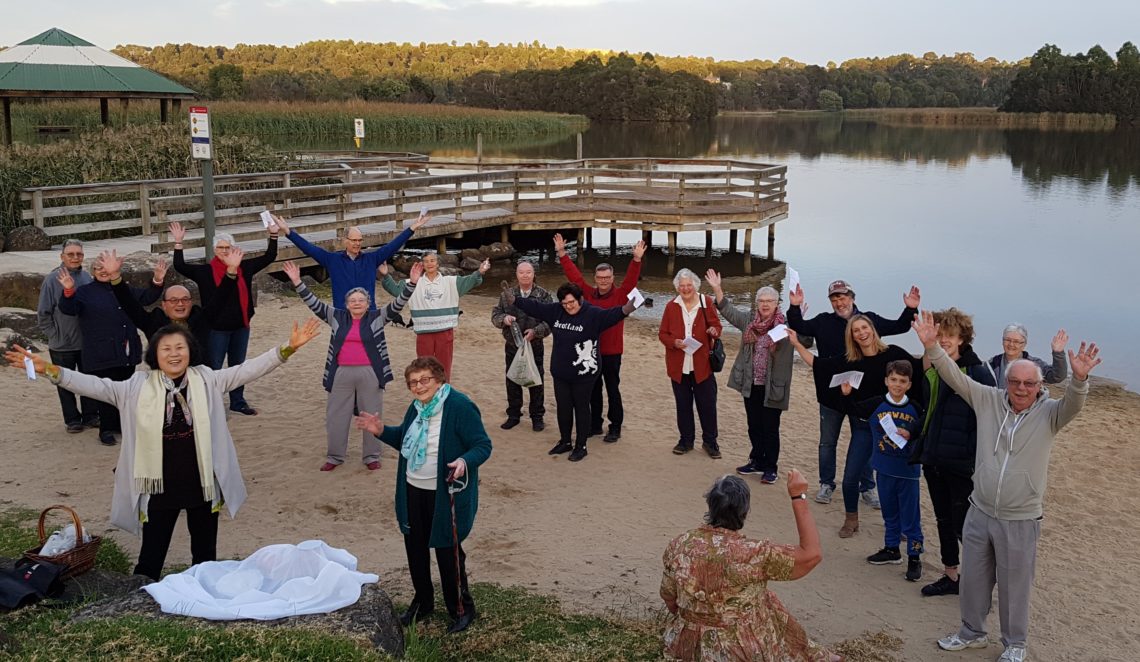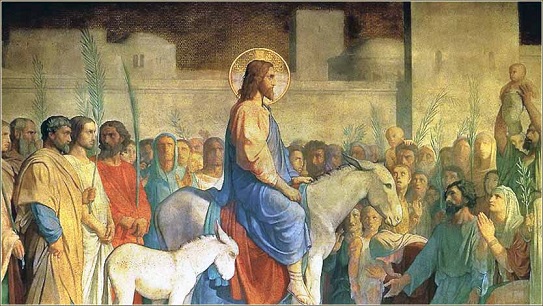

An early start to the day: 6:30 am Sunday 21st April 2019. Some dedicated members of the Outer Eastern Cluster of Uniting Churches met at Lillydale Lake for a Dawn Service on Easter Sunday.



The traditional Easter greeting is ‘Christ is risen!’ to which the traditional response is ‘He is risen indeed!’. It is also traditional at Easter to sing joyful songs with many alleluias, some of which we will be singing this Sunday. Yet the Gospel accounts of the resurrection paint a very different picture. None of the disciples were singing, none were joyful. Instead they were trying to keep a low profile and had locked the doors.
It was the women who dared to go to the tomb to anoint Jesus’ body with spices, a traditional Jewish custom for the dead. We are told that the stone sealing the tomb had been rolled back and that the women saw a vision of angels. They do not rejoice at the news but rather are terrified and flee. The male disciples struggle to understand their message that Jesus has risen.
Perhaps we are so used to hearing this story that it no longer surprises us or excites us. But the message of Easter is nothing if not astounding. It is God’s ‘yes’ to the world’s ‘no’. May this story of hope and transformation continue to disturb and surprise us.

On Good Friday we hear the Gospel passion narrative as it tells the story of Jesus’ rejection, suffering, death and burial. This is a powerful story that provides us with the enduring symbol of Christian faith, namely the cross. It’s a story that’s told from the perspective of the followers of Jesus as they watch the impossible unfold before their eyes – as the Messiah suffers and dies.
The story never explains why Jesus had to die or exactly what his death accomplished. Initial answers to these questions are supplied by the apostle Paul and later by generations of Christian theologians and hymn writers. These sources provide various explanations.
Western Christianity (as handed down to us through the Catholic Church) places the events of Good Friday at the heart of our faith, with the death of Jesus on the cross seen as the atoning sacrifice for human sin, redeeming us from sin and making possible forgiveness and restored relationship with God. Within this legal framework, the day may well be called ‘Good’ Friday or ‘God’s’ Friday as God deals decisively with the problem of sin. An appropriate response might be thankfulness.
Eastern Christianity (as handed down through the Orthodox Church) has quite a different perspective. The basic human problem is not sin, but rather death that came into the world through Adam and Eve. Through his voluntary submission to the cross – and especially through the resurrection – Jesus overcame the power of death, thus making possible the glorification of humanity, its restoration to the image of God. Good Friday – and Easter Sunday – thus demonstrate the power and victory of God. An appropriate response might be worship.
Progressive Christianity has a different take again. As a prophet, Jesus continually challenged the dominant ruling powers and their injustices (both the religious leadership of Israel and also the occupying power of the Roman Empire). In the way of human society, these powers fought back and did what forces of domination do – silence and eliminate the perceived threat. Jesus’ death was the inevitable result of the clash between power and politics on the one hand and compassion and justice on the other hand. An appropriate response might be to take up the fight for justice.
What are we to make of the story of Good Friday? How do we find our place in the story? Are we among the silent members of the crowd who, out of fear, say and do nothing when Jesus is condemned? Are we like the women who weep for Jesus as a good and innocent person put to death? Are we among the cynical people who mock Jesus for not delivering what he promised, a new society that reflects God’s ways? Or are we fallible followers of Jesus who want to follow but who deep down prefer comfort, respect and taking care of our own needs? Or perhaps do we sometimes feel like Jesus, abandoned by our friends and even by God?
Good Friday offers us a powerful and multivalent story that is open to multiple layers of meaning. The invitation is to sit with the story a while, recognizing that while we are part of broken humanity that is capable of great evil, we are also part of Christ’s family committed to walking in the compassionate and radical ways of Jesus, wherever that road may take us.


Palm Sunday is the day on which we remember Jesus entering Jerusalem riding on a donkey, while the crowds waved palm branches and sang songs of praise. People were not quite sure what to make of Jesus – was he a radical prophet? A rival king to Caesar? Or simply a compassionate healer and teacher? How could his small band of followers really think that they could make a difference in the cold hard world of power and authority?
What do we see and hear in this story? Do we too place fairly rigid expectations around Jesus or do we let him speak his life transforming words to us? These questions are all valid as we contemplate the place of Jesus and our faith in the world today.

During this last week, the Federal Treasurer has handed down the annual Budget for Australia. The headline message is that after several years of careful and prudent financial management, the country will soon, hopefully, balance its books. It’s the sort of Budget that might have appealed to Judas, who was apparently in charge of finances for the disciples.
Then along comes Mary, sister of Martha and Lazarus, and pours a large flask of very expensive perfume all over Jesus’ feet. Here is extravagant faith and deep love in action. Judas is outraged at the waste while Jesus praises her action as a preparation for his burial. I wonder whether we more naturally embrace a mindset of scarcity or a mindset of abundance. Do we tend to ration our resources or are we willing to (at least sometimes) give extravagantly? Last week’s story of the prodigal son and this week’s story about Mary both point towards the extravagance of God’s kingdom. It also points ahead to the costly and extravagant gift of Jesus at Easter.